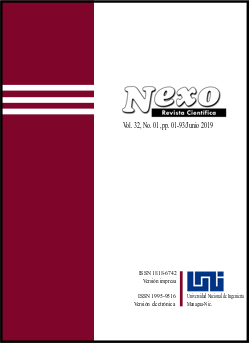Rainfall erosivity factor in the Xolotlán lake subcatchmen, Managua
DOI:
https://doi.org/10.5377/nexo.v32i01.7986Keywords:
Erosivity, Rainfall; Modified Fournier index, Precipitation Concentration IndexAbstract
In this paper the study of erosivity rainfall factor in the Xolotlán Lake sub catchment is exposed, that belong to the 9525 catchment from Nicaragua. The objective of the study was to determinate the Revised Universal Loss Equation (RUSLE) erosivity factor”, from daily pluviograph data of the station 69027 (Managua Airport) and monthly pluviometric data in 7 stations distributed in the sub catchment and nearby. A simple lineal regression was done with the monthly R and monthly precipitation, with a correlation coefficient of r2 = 0.86. Since in the sub cathcment there is only one pluviograph station, the Modified Fournier Index was used to estimate de R values in the pluviometrics stations. The study suggests that the annual mean erosivity factor rage from 5,000 Mj mm / (ha-h-year) in the lower side of the sub catchment to 7,250 in the upper side, that represent a rain with a moderate erosivity power.
Downloads
Downloads
Published
How to Cite
Issue
Section
License
The authors who publish in Nexo Scientific Journal agree to the following terms:
- Authors retain the copyright and grant the journal the right of the first publication under the license Creative Commons Attribution License https://creativecommons.org/licenses/by/3.0/, which allows others to share the work with a recognition of the authorship of the work and the initial publication in Nexo Scientific Journal.
- Authors may separately establish additional agreements for the non-exclusive distribution of the version of the work published in the journal (for example, in an institutional repository or a book), with the recognition of the initial publication in Nexo Scientific Journal.
- Authors are allowed and encouraged to disseminate their works electronically (for example, in institutional repositories or in their own website) before and during the submission process, as it can lead to productive exchanges, as well as earlier and greater citation of published works.











